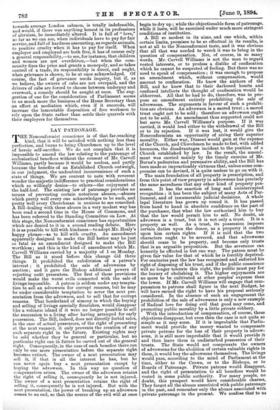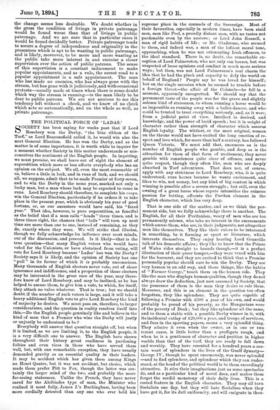LAY PATRONAGE. T HE Nonconformist conscience is of that far-reaching kind,
that it will be satisfied with nothing less than perfection, and burns to bring Churchmen up to the level of heroic self-sacrifice. We do not complain that it is impossible to amend the law relating to the patronage of ecclesiastical benefices without the consent of Mr. Carvell Williams, partly because it would be useless, and partly because the benefits of an Established Church outweigh, in our judgment, the undoubted inconvenience of such a state of things. We are content to note with reverent wonder the majestic indifference to practical considerations which so willingly denies—to others—the enjoyment of the half-loaf. The existing law of patronage provides no means of preventing certain notorious abuses,—abuses which pretty well every one acknowledges to be such, and pretty well every Churchman is anxious to see remedied. A Bill dealing with these abuses in a very modest way has been read a second time in the House of Commons, and has been referred to the Standing Committee on Law. At this stage, the Nonconformist conscience has opportunities which are denied to it in a second reading debate. Here it is as possible to kill with kindness—to adopt Mr. Healy's happy phrase—as to kill with cruelty. An amendment apparently designed to make the Bill better may be just as fatal as an amendment designed to make the Bill worthless ; and this is the kind of amendment which Mr. Carvell Williams carried by a majority of 1 on Monday. The Bill as it stood before this change did three things. It prohibited the subdivision of a patron's interest ; it prohibited the sale of advowsons by auction ; and it gave the Bishop additional powers of rejecting unfit presentees. The first of these provisions would make the worst evils connected with the sale of livings impossible. A patron is seldom under any tempta- tion to sell an advowson for corrupt reasons, but he may be under considerable temptation to sever the next pre- sentation from the advowson, and to sell that for corrupt reasons. That borderland of simony in which the buying and selling of livings specially flourishes, would disappear like a volcanic island if it were no longer possible to sell the succession to a living after having arranged for early possession. The Bill, indeed, does not directly forbid sales, in the case of actual possessors, of the right of presenting at the next vacancy, it only prevents the creation of any such separate right in the future. Existing rights may be sold whether they be general or particular, but no particular right can in future be carved out of the general right. Consequently, in the case of each benefice there can only be one more presentation before the separate right becomes extinct. The owner of a next presentation may sell it, if that is all the interest he has, but he can • never again buy a next presentation except by buying the advowson. In this way no question of compensation arises. The owner of the advowson retains the right of selling it, consequently he is not injured. The owner of a next presentation retains the right of selling it, consequently he is not injured. But with the next presentation, the power of breaking up an advowson comes to an end, so that the source of the evil will at once begin to dry up ; while the objectionable form of patronage, while it lasts, will be exercised under much more stringent conditions of institution.
A Bill so modest in its aims, and one which, within certain limits, promises to be so effectual in its results, is not at all to the Nonconformist taste, and it was obvious that all that was needed to wreck it was to bring in the question of compensation. Not, of course, in so many words. Mr. Carvell Williams is not the man to regard vested interests, or to profess a dislike of confiscation which he cannot be suspected of feeling. But there was no need. to speak of compensation ; it was enough to propose an amendment which, without compensation, would amount to confiscation. He knew the authors of the Bill, and he knew that to their darkened hearts and confused intellects the thought of confiscation would be abhorrent. All that he had to do, therefore, was to pro- pose an amendment entirely prohibiting the sale of advowsons. The arguments in favour of such a prohibi- tion are obvious. An advowson is a sacred trust ; a sacred trust ought not to be sold ; therefore an advowson ought not to be sold. An amendment thus supported could not but serve Mr. Carvell Williams's purpose. If it was carried, it would lead either to the withdrawal of the Bill or to its rejection. If it was lost, it would give the Nonconformists an opportunity of airing their superior morality. Either way, Dissent would gain at the expense of the Church, and Churchmen be made to feel, with added keenness, the disadvantages incident to the position of a Church established by law. In the result, the amend- ment was carried mainly by the timely exercise of Mr. Burns's pedestrian and persuasive ability, and the Bill has been made so impracticably virtuous that, unless some com- promise can be devised, it is quite useless to go on with it. The main foundation of all property is prescription, and. from this point of view property in advowsons has precisely the same sacredness that any other kind of property pos- sesses. It has the sanction of long and uninterrupted recognition ; it has been the subject of many Acts of Par- liament, and of innumerable judicial decisions. A whole legal literature has grown up round it. It has passed from hand to hand in absolute confidence on the part of the purchaser, that what the law authorised him to buy that the law would permit him to sell. No doubt, an advowson is a trust, but it is not only a trust. It is a property as well. As a trust, its possession imposes certain duties upon the donor, as a property it confers upon him certain rights. If it is said that the two characters ought to be severed, and that advowsons should cease to be property, and become only trusts that is an arguable proposition. But the severance can honestly be effected in but one way. The patron must be given fair value for that of which he is forcibly deprived. For centuries past the law has recognised and enforced his right of disposing of his trust, and if the public conscience will no longer tolerate this right, the public must pay for the luxury of abolishing it. The higher enjoyments are no more to be cultivated at other peoples' expense than the lower. If Mr. Carvell Williams will engage that com- pensation to patrons shall figure in the next Budget, he will have earned the right to have his proposal seriously considered. In the absence of such an engagement the prohibition of the sale of advowsons is only a new example of Radical love for doing evil that good may come, and promoting public morality by a little private robbery. With the introduction of compensation, of course, these objections disappear, but even then the case is not quite so simple as it may seem. If it is improbable that Parlia- ment would provide the money wanted to compensate private patrons for the loss of their property in advow- sons, it is still more improbable that it would provide it and then leave them in undisturbed possession of their trusts. The State would not compensate the owners of advowsons for the abolition of certain valuable rights in them, it would buy the advowsons themselves. The livings would pass, according to the mind of Parliament at the time, either to the Crown, or to the Bishops, or to Boards of Patronage. Private patrons would disappear, and the right of presentation to all benefices would be vested in some public authority. For many people, no doubt, this prospect would have considerable charms. They forget all the abuses associated with public patronage in the past, and remember only the abuses associated with private patronage in the present. We confess that to us
the change seems less desirable. We doubt whether in the gross the condition of livings in private patronage would be found worse than that of livings in public patronage. And we are sure that in particular cases it would be found decidedly better. Private patronage tends to secure a degree of independence and originality in the presentees which is apt to be wanting in public patronage, and is likely, moreover, to be more and more wanting atil the public take more interest in and exercise a closer supervision over the action of public patrons. The sense of this supervision is a constant inducement to make popular appointments, and as a rule, the surest road to a popular appointment is a safe appointment. The man who has made no enemies, who has always gone with the stream, but has gone with it j udiciously, and with occasional protests—usually made at times when there is some doubt which way the stream is running—is the man likely to be dear to public patrons. We are not anxious to see this tendency left without a check, and we know of no check which acts so automatically, and on the whole so well, as private patronage.







































 Previous page
Previous page